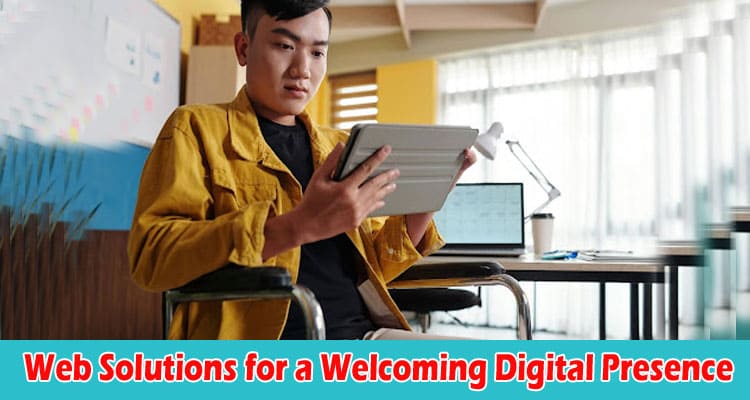In the hospitality industry, providing a welcoming experience extends beyond physical spaces to the digital realm, especially for guests with disabilities. That’s why companies like accessiBe have developed web accessibility solutions and services to accommodate and provide better experiences to everyone.
This article covers web accessibility and highlights the five key solutions that can transform online hospitality services into inclusive, user-friendly platforms. By understanding and implementing these solutions, hospitality businesses can ensure that their digital presence is not only accommodating but also engaging for all guests, regardless of their abilities.
1. Accessible Online Reservation Systems
A cornerstone of hospitality digital accessibility is an online reservation system that caters to all users, including those with disabilities. Key features for an accessible system include:
- Keyboard Navigation: Providing full functionality via keyboard for users with motor impairments who cannot use a mouse.
- Screen Reader Compatibility: Ensuring that content is readable by screen readers for visually impaired guests.
- Clear Form Instructions: Offering explicit and easy-to-understand instructions and error messages for all users, especially beneficial for those with cognitive disabilities.
Such inclusive design not only complies with accessibility standards but also provides a smoother booking experience for all potential guests, emphasizing the hospitality business’s commitment to inclusion.
2. Inclusive Virtual Experiences
Providing accessible virtual tours and interactive content is crucial in offering an inclusive digital experience in the hospitality sector. Key elements to ensure accessibility in these features include:
- Audio for Virtual Tours: Incorporating audio descriptions in virtual tours helps visually impaired guests understand and enjoy the visual aspects of your property.
- Captions and Sign Language in Videos: Adding captions and sign language interpretation to videos makes them accessible to guests with hearing impairments.
- Accessible Interactive Elements: Ensuring interactive elements like maps or photo galleries are navigable with assistive technologies and easy to use for all guests.
These accessible virtual experiences allow potential guests to explore and engage with your services online, creating a welcoming impression right from the start.
3. Optimized Mobile Access for Diverse Abilities
Ensuring your hospitality website is fully accessible on mobile devices is crucial for accommodating guests with diverse abilities. Essential features for mobile accessibility include:
- Responsive Design: A responsive website layout adapts to different screen sizes, making it easier for guests using various devices, including those with motor impairments.
- Touch-Friendly Interfaces: Interfaces that are easy to navigate by touch benefit guests who may not use traditional navigation methods.
- Voice Navigation Support: Integrating voice navigation aids guests who rely on voice commands, enhancing accessibility for those with motor or visual disabilities.
Mobile optimization not only broadens your website’s accessibility but also caters to the modern traveller’s preference for on-the-go information access, making your digital presence more inclusive and user-friendly.
4. Accessible Real-Time Communication Tools
Accessible real-time communication tools are vital for providing immediate assistance to guests with disabilities. Key aspects of making these tools accessible include:
- Screen Reader-Friendly Chatbots: Ensuring chatbots and live chat features are compatible with screen readers.
- Easy-to-Use Interface: Designing chat interfaces that are straightforward and easy to navigate.
- Alternative Contact Options: Providing multiple ways to contact customer service, like text-based chat and voice calls, to accommodate different communication preferences and needs.
Implementing these accessible communication features not only enhances the guest experience but also ensures that assistance is readily available for all, reflecting the hospitality industry’s commitment to exceptional customer service.
5. Providing Multilingual Accessibility Features
In the global hospitality industry, multilingual accessibility is key to catering to an international audience, including those with disabilities. Essential aspects of this include:
- Accessible Language Selection: Easy-to-navigate options for language selection cater to guests with motor or visual impairments, allowing them to choose their preferred language effortlessly.
- Translated Content with Accessibility in Mind: Offering translated website content that maintains accessibility features, such as alt text and screen reader compatibility, ensures that language options do not compromise accessibility.
- Culturally Sensitive Design: Being mindful of cultural differences in design and communication can enhance the user experience for international guests with disabilities.
Creating a World of Inclusive Hospitality Experiences
Embracing web accessibility in the hospitality industry is about much more than meeting standards; it’s about creating welcoming, inclusive experiences for all guests, regardless of their abilities or backgrounds.
By implementing solutions like accessible online booking systems, inclusive virtual content, mobile optimization, real-time communication tools, and multilingual features, hospitality businesses can ensure their digital presence is as warm and inviting as their physical one. This commitment to digital inclusivity not only enhances the guest experience but also positions your business as a leader in accessible and responsible hospitality.







